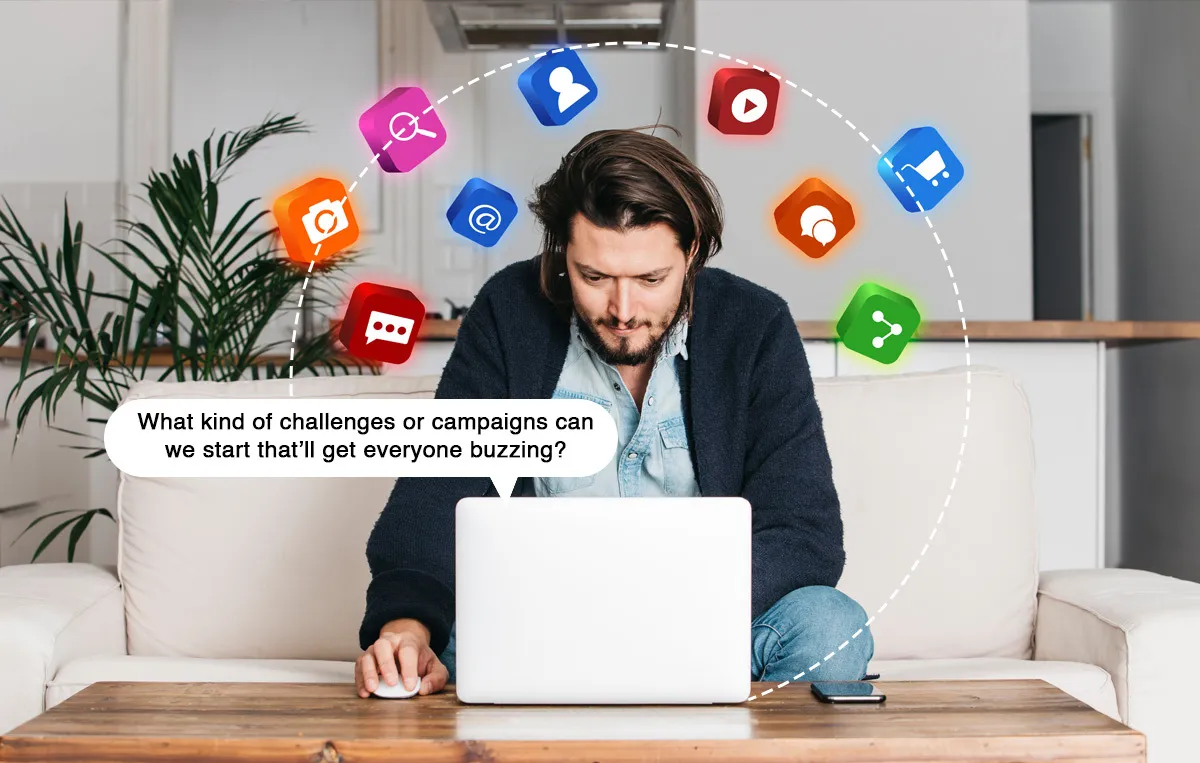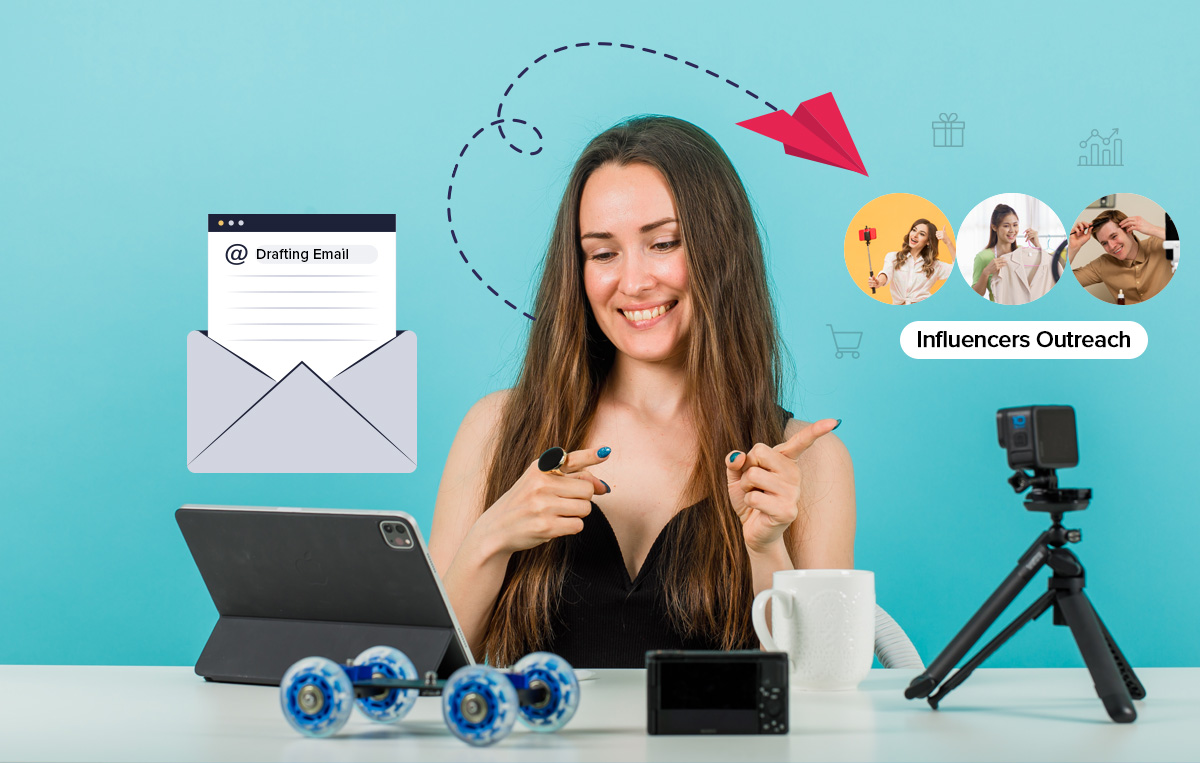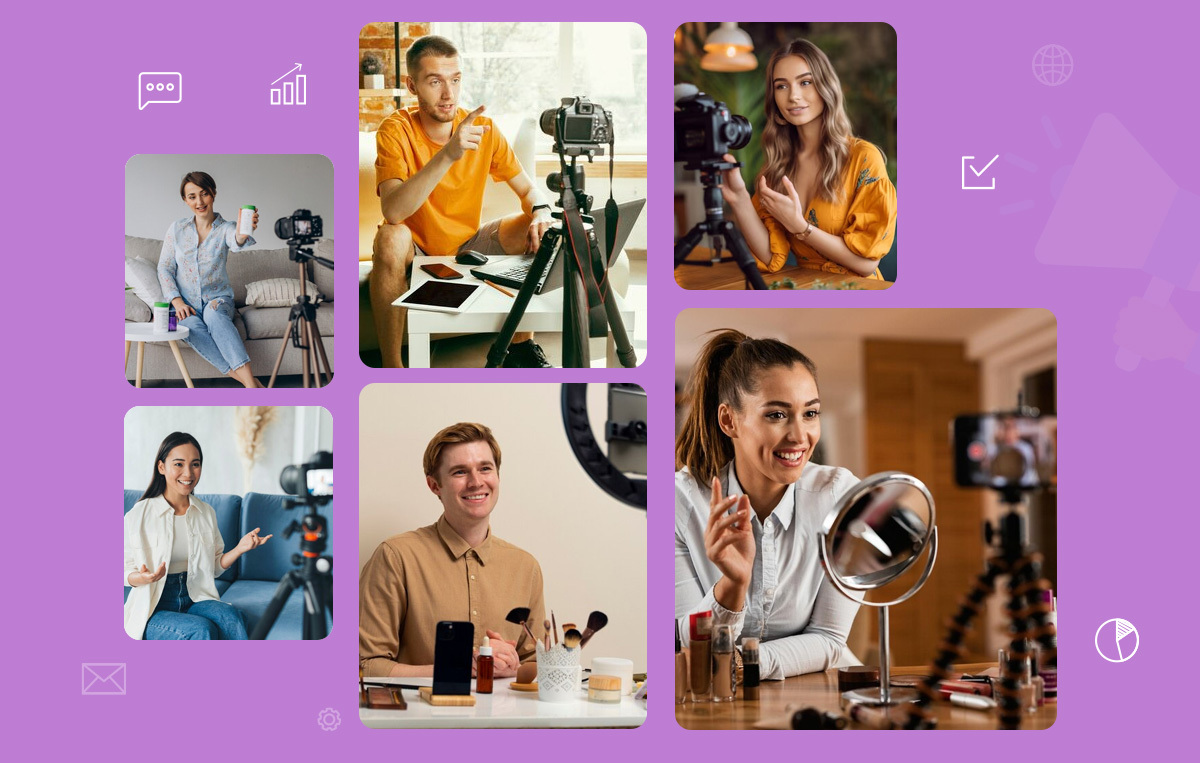Businesses worldwide embrace influencer marketing to advertise their brands, products, or services to a wider audience. According to an IMH report, about 60% of brands incorporate at least ten influencers in their marketing campaigns. The purpose is to reach the target market, increase brand awareness, and boost sales.
But then, it is not a simple and obvious procedure – you must fully grasp the best strategies on how to negotiate with influencers if you intend to forge a win-win agreement and a successful influencer campaign.
This means that you must have a negotiation plan, know your goals, and stick to your budget. The ultimate goal of influencer negotiation is to create a valuable, mutually beneficial, transparent, and long-lasting partnership.
Let’s look at some of the best strategies you can follow to win over your negotiations with influencers.
Key Takeaways
- Trust is vital for fostering a sustainable influencer marketing partnership.
- Setting clear goals and expectations during negotiation ensures that the influencers’ services align with your brand’s needs.
- Negotiating fair compensation models, including flat fees, commissions, or product seeding, is crucial to the success of influencer collaborations.
- Long-lasting influencer relationships require continuous engagement, regular communication, and feedback.
The Role of Negotiation in Building Strong Influencer Relationships
Negotiation is key for building strong influencer partnerships. This is where you get to determine and set the rules of engagement between your business and the influencer(s).
During negotiations, marketers and influencers establish the essential aspects of the partnership, such as communication lines, objectives & expectations, pricing, and trust.
Here is an extensive highlight of the role of negotiation in cultivating strong influencer partnerships:
Establishing Effective Communication Lines
We all know that social media has tremendous power to shape consumers’ perceptions about your brand. This power inherently resides among influencers with a huge following – they get to drive brand awareness and shape customer sentiment.
That is why it is necessary to establish proper and effective communication channels with influencers. Some of the tips for achieving effective communication include addressing any concerns raised by influencers, discussing content ideas, and sharing marketing strategies.
You must also maintain open and regular communication with influencers to ensure that the partnership is on track. Keep tabs on the influencer campaign’s progress to know whether or not you should make some adjustments to your partnership.
Building Trust

Trust is the cornerstone of any form of partnership; without it, no transaction can be completed between parties. Influencer partnerships are not an exception – marketers should trust their influencers and vice versa. This is where negotiation intervenes; it brings parties together to an understanding, thus fostering deeper connections and trust.
When you are negotiating with an influencer, you actively engage in a discussion, give your full attention, and pay attention to each other’s needs and ideas.
As a brand or business, you need to acknowledge the influencer’s expertise in social media marketing and listen to their feedback or concerns because that’s why you’re hiring them in the first place. Actively engaging and listening to influencers shows them that you are confident in their work.
This builds the necessary trust required to create a successful influencer partnership.
Setting Objectives and Expectations
Nothing is more dangerous than getting into a partnership without defining the scope and expectations. You should set clear goals and objectives from the onset, and the influencers must understand what you expect from them. Essentially, you and the influencer must align your efforts toward achieving a common goal, which can be done during negotiations.
For instance, if you run a fashion and beauty store, you should clearly communicate your desired outcome with the influencer.
Are you launching a new product, seeking to improve your brand exposure, or intending to drive sales?
This helps in formulating appropriate strategies that suit your expectations.
On the other hand, the influencer should also lay out their expectations regarding creative liberty or compensation and also inquire whether there are any restrictions.
Have you ever noticed a situation where an influencer created content that was not appreciated by the brand?
Sometimes, influencers overestimate the creative freedom granted to them, which often leads to a misunderstanding or termination of the partnership (worst-case scenario).
Discussing Pricing and Compensation

More often than not, lack of compensation is usually the root cause of terminating an influencer partnership.
Think about it: would you offer your services to an entity that inadequately compensates you, delays your compensation, or does not compensate you at all?
Nobody can endure such treatment; that is why you’ll notice influencers being a little bit hard on you when this subject crops up.
So, it is important to agree upon the best compensation model with the influencer, whether it is financial compensation, exclusive discounts, free products, or any other benefits. The power of fair compensation terms should not be underestimated – when an influencer is content, your brand thrives.
Negotiation Strategies for Win-Win Collaborations For Brands
You now know how important negotiation is when creating an influencer partnership. But it is not just about getting into a room with an influencer to negotiate the terms of the partnership. Understanding how to make the influencer marketing partnership work is important. You need to curate strategies that will ensure both your brand and the influencer benefit from the collaboration.
Let’s find out some of the strategies you can adopt to guarantee a win-win partnership.
#Strategy 1: Establishing Budgets and Compensation Models
Budgeting aims to ensure that you don’t overspend on one form of marketing. It is important to restrict your influencer marketing expenditure to the allocated budget. Discussing compensation models with the influencer is one effective way to ensure you don’t go overboard.
If possible, you can try to merge all the available compensation options to maximize the success of the campaign.
Some of the common compensation models include:
- Flat fee – This model adopts a structure where you pay an influencer for every post they make about your brand, product, or services. The cost varies from one influencer to another and usually depends on the post’s engagement rate and impressions generated.
- Commission – Affiliate marketing is probably the most popular compensation model you’ve encountered. It entails negotiating a profit-sharing formula based on sales. For example, you can guarantee the influencer a percentage commission on every referral that translates into a sale. This helps you minimize the amount of upfront fee you’ll pay to get the partnership running.
- Product seeding – Product seeding is the most common yet effective marketing strategy where brands offer free products/samples to influencers in return for their promotion on social media handles. For instance, if you are a mobile phone company, you can give free phones to nano influencers (100-1000) or micro-influencers (1000-10000) on Instagram, TikTok, YouTube, or any other popular platform.
View this post on Instagram
#Strategy 2: Discussing Deliverables and Timeline Expectations
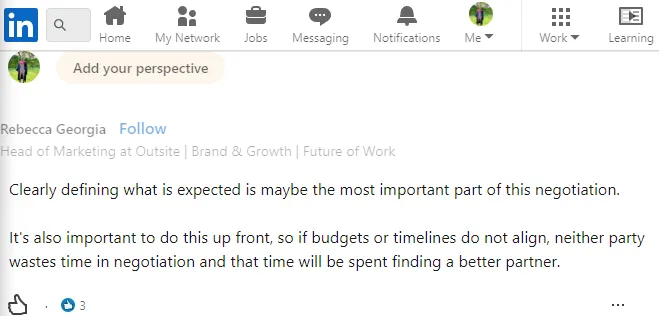
As we have already mentioned, discussing your deliverables and expectations of the influencer collaboration is important. Ensure that you are very specific on things like:
- Frequency and timing of posts
- Post captions
- Expected engagement rate
- Campaign timeline
- Content usage rights and restrictions
- Content type (whether you prefer blogs, images, videos, or text)
When your expectations for the partnership are ambiguous, the collaboration is more likely to flop. This is why you must be specific on the content you anticipate.
#Strategy 3: Handling Rejections and Counteroffers
Sometimes, when you make an initial offer that is rejected, it does not mean the decision is final. As long as the other party hasn’t walked out of the negotiations, you still have a chance to convince them to accept your initial offer or a slightly improved offer.
But this can only happen if you stay calm and positive after getting the rejection or counteroffer – don’t take it personally. You should instead mention that you’re working on a budget and try to make an improved offer that almost matches the counteroffer.
In a nutshell, be flexible, but don’t strain your budget too much.
#Strategy 4: Crafting Persuasive Counteroffer Proposals
Before you show up in a negotiation with an influencer, conduct research on the trending market practices and standards. Acquaint yourself with the current costs of hiring different influencers across various social media platforms.
This will help you estimate your counteroffer upfront in the event that your initial offer is rejected. The chances of rejecting your proposal are minimal since you’ll negotiate from a point of confidence and knowledge.
#Strategy 5: Brand Exclusivity
For an influencer, the partnership you’re offering is just one of the many that helps them pay their bills. Sometimes, they may end up endorsing multiple competitors just because an irresistible offer was made and they’re looking to maximize their earnings.
You must have a conversation on brand exclusivity with your influencer. You can also renegotiate the terms of your collaboration if it means that the influencer won’t endorse your competitors.
#Strategy 6: Non-Disclosure Agreement
An influencer partnership might mean that you have to divulge some sensitive information to the influencer. On the other hand, the influencer might also seek confidentiality on the nature of the contract offered by your brand.
That’s where the legal team comes in – they’ll draft a non-disclosure agreement that binds you and the influencer. This ensures confidentiality for both parties.
#Strategy 6: Negotiate the Scope of Work

This is an epic negotiation tactic that many businesses may not know about. Instead of negotiating for a lower influencer fee, ask them to do more for the rates they are requesting.
For example, if an influencer wants $100 USD per Instagram post, request for the images and videos to be reposted on the Instagram stories without extra cost. This means the influencer must do extra to receive the desired fee/rate.
#Strategy 7: Offer Long-Term Collaboration
If you have negotiated long-term contracts with a client before, you understand that a discount is always a subject of discussion during the negotiations. It is not a strange practice in influencer marketing – you can request a discounted partnership in exchange for a long-term deal.
If the initial quote by the influencer exceeds your budget, inform them about it and offer perks like intermittent bonuses and consistent collaboration.
Price Negotiation Strategies
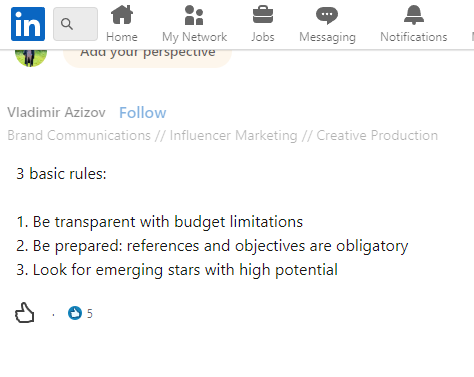
It is common for influencers to withhold information on their influencer contracts. In fact, some people believe that the influencer marketing industry lacks transparency regarding payments. This makes it even more difficult for you to prepare for negotiations, but it doesn’t mean that we don’t have some tricks to help you navigate the situation.
The purpose of these strategies is to guide you when budgeting and negotiating influencer partnerships. We don’t intend to coerce you into underpaying influencers but rather get a sustainable and successful collaboration.
Here is what you should do:
#Strategy 8: Ask for Influencer Rates First
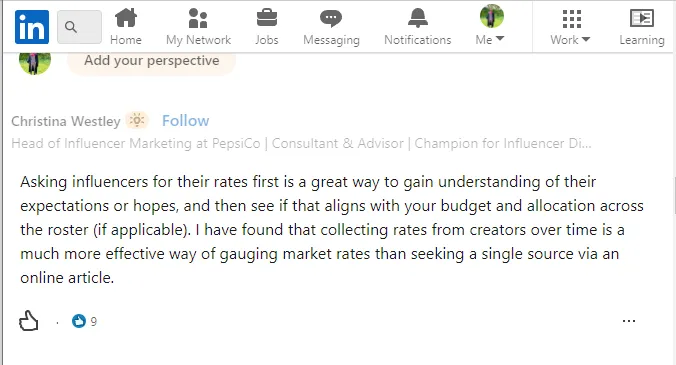
When you ask for influencers’ rates first, you get an overview of their compensation expectations, thus helping you avoid offending them with a meager offer. You should also ask them whether there is a discount for a long-term collaboration. The aim is to build a sense of durability and sustainability as they ponder the potential benefits of the partnership.
#Strategy 9: Make a Counteroffer
After receiving the influencer’s initial rates, what next? Does it match or exceed your budget? Check whether it matches the services offered (engagements, impressions, views, and followers).
Once you have assessed all the relevant factors, counter the offer with a reasonable figure. Try not to lower it too much since the quality of services you’ll receive depends on whether the influencer is happy with the deal you’re offering.
#Strategy 10: Reject Partnerships Beyond Your Budget
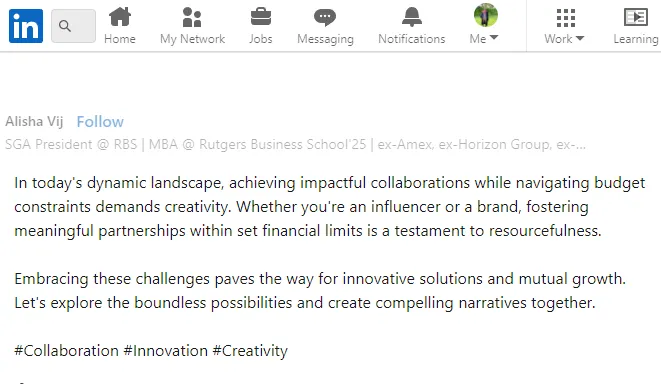
If none of your offers are accepted, don’t struggle to force a partnership by overstretching your budget. Negotiations are okay to fall apart; it’s just part of business. You should instead politely decline the influencer’s proposal by indicating that it’s beyond your budget and leave the door open for a possible future collaboration.
Building Long-Term Relationships with Influencers
Building a long-lasting partnership with your influencer is the final and most difficult step. This kind of partnership grows and changes over time due to shifts in conversions, engagement rates, followers, traffic, and other contemporary factors.
Let’s look at some methods to help your influencer marketing collaboration last longer.
Continuous Engagement

The needs of a company or business occasionally change to adapt to market shifts and consumer behavior. What your brand needs to drive sales right now might not be the same six months later. The dynamics of your business also change with every growth and progress you make.
But you can’t expect influencers to adapt to these changes if you don’t engage them frequently on your brand’s needs. You should maintain regular communication, give feedback, and share ideas on the campaign’s progress. This nurtures trust and rapport between you and the influencers and ultimately cultivates a long-term influencer relationship.
Collaborating on Multiple Campaigns for Relationship Building
Remember that the business is yours at the end of the day. You shouldn’t leave it up to the influencer to create content ideas for every marketing campaign. Try to feature in occasional strategy meetings and share ideas with your influencer(s). This kind of interaction brings you and your influencer closer and might just be the beginning of a long-term cooperation.
Perfect Your Negotiations with Influencers
The thought of negotiating with an influencer might seem intimidating, especially if it’s a celebrity. But they are just normal humans who also need to make extra dollars, so negotiating shouldn’t be a problem. If you follow the negotiation strategies we have provided, you should be able to offer fair compensation to influencers while also observing your budget.

